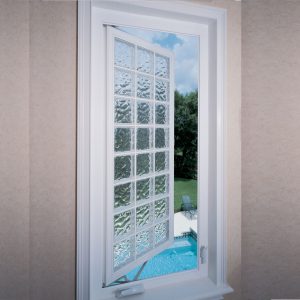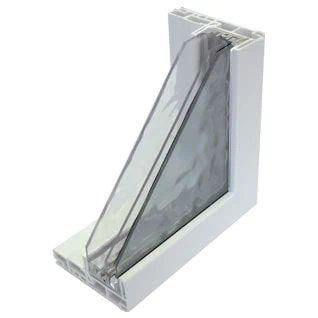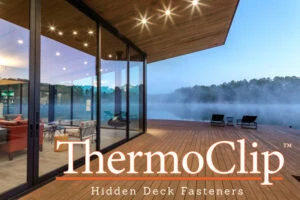Offering design appeal and privacy, block windows have been used in homes and commercial projects for more than a century. What started as the inclusion of heavy true glass block windows has evolved over the years to the embracement of lighter-weight acrylic block windows. Both have their place in today’s market, but which one is right for you?
“True glass blocks are now used primarily for basement windows in homes and to create large showpiece walls in commercial projects,” says Roger Murphy, president of Hy-Lite, a U.S. Block Windows Company. “Both glass and acrylic block windows are frequently installed in bathroom applications to give people ultimate privacy in the home.
“The advantages of the acrylic block windows are numerous. They’re lighter in weight than glass block products, so they need less structural support. And, very importantly, because of their lightweight nature, they can be made operable — including single-hung, casement and awning styles — so they open to allow more light and ventilation into a room. You simply can’t achieve that with glass block windows.”
Murphy relates that, while acrylic block windows lead the sales for his company, there are definitely pockets across the country where glass block windows are preferred. “The Southwest — and Texas in particular — are strong glass block markets due to traditional builder and homebuyer style preferences in those locations,” says Murphy. “We also find that builders in the Northeast install a large number of true glass block windows in traditional basement applications.
“The use of acrylic block windows is much more widespread across the country. The Southeast absolutely is the largest user of our acrylic block products. But the Southwest and Great Lakes region have growing sales. Builders nationwide are using a variety of acrylic block windows to enhance privacy. These windows also add style and natural light in their homes.”
With U-values and Solar Heat Gain Coefficients (SHGCs) better for acrylic block windows than glass block windows, energy efficiency gains shine out with acrylic block windows. In addition, acrylic block products are available in more style options (such as Wave, Glacier, Cross Rib patterns) and in more sizes (including 6-, 8- and 9-inch sizes) than glass blocks. And, for those people requiring custom shapes and sizes for their windows, acrylic blocks have the edge.
Since cost is a factor with any building product, Murphy notes that, on average, acrylic block windows are less expensive than glass block windows. A framed, fixed acrylic block window using the wave pattern of blocks at 47 inches by 47 inches in size costs approximately 20 percent lower in price than a similarly-sized glass block window.
“The choice of material in a block window truly comes down to customer preference,” says Murphy. “The energy-efficient features of acrylic block tend to make them a more popular choice with environmentally-minded homeowners. Plus the lighter weight aspects of acrylic block make them a favorite of builders.”
When should an acrylic block or glass block window not be used in a setting? According to Murphy, glass block windows should never be installed if the weight of the unit (typically more than three times heavier than an acrylic block unit) is not sufficiently supported by the surrounding structure. Glass block windows also cannot be used when a custom size is desired.
As for acrylic block windows, they should not be used when the area around it is subject to harsh cleaning products, abrasive cleaning tools or power washers. These situations are better suited to glass block windows.
Hy-Lite, a U.S. Block Windows Company, is the leading manufacturer of acrylic block, glass block and decorative glass windows. The company’s privacy product options include acrylic block shutters, accent panels, radius walls, partition walls and door inserts. Since 1988, the Pensacola, Florida-based company has been committed to providing residential and commercial construction professionals and homeowners with elegant, affordable privacy window designs. For more information, visit www.hy-lite.com.





